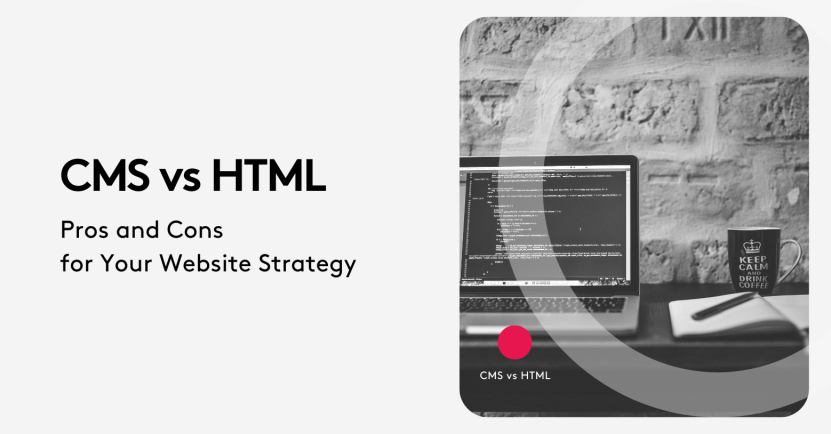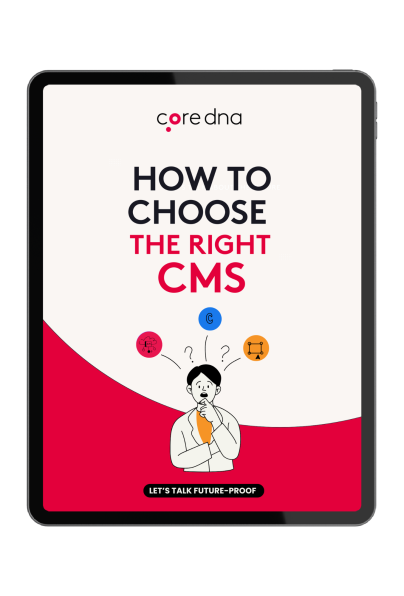CMS vs HTML: The Key Differences You Need to Know

Understanding the difference between CMS vs HTML is essential for making the right choice for your website. Whether you want full customization or streamlined content management, both options offer distinct advantages.
But if you’re new to the game, you may have conducted some research and found that some web developers prefer to code websites in HTML, while others prefer to use something called a CMS (Content Management System).
Confused? We don’t blame you, which is why we’ve put this guide together to help you understand the difference.
Key takeaways
- Speed vs. Simplicity: HTML sites offer faster loading times but are best for static, rarely-updated pages, while CMS solutions simplify managing dynamic, content-rich websites.
- Ease of Use: CMS platforms allow non-technical users to quickly create, manage, and update content without extensive coding knowledge.
- Customization Trade-offs: HTML gives complete design freedom but requires manual coding for every change; CMS platforms offer easier customization through pre-built templates and user-friendly interfaces.
- Scalability & Collaboration: CMS platforms provide multi-user support, streamlined workflows, and easy content previews, ideal for growing businesses and collaborative teams.
On this page:
What is HTML?
HTML is a language that allows you to create websites, web pages, and apps. It is very simple to use and understand. Business stakeholders, project managers, developers, and designers like it because it is easy to learn and install. It is also free and open source. You can use it for your own projects or even sell it if you wish. It works in every browser and is easy to change. It is also easy to integrate with other programming tools.
Without HTML, we would have web pages that would look no less interesting than a page of unformatted text. HTML allows us to add style to text, insert and format images, embed video, customize fonts, add color, and a whole lot more.
The example below shows you the HTML coding for Core dna’s homepage:

What are the benefits of HTML?
Although many people say HTML is an old technology the reality is that this language powers all the websites on the Internet. Even websites that now use the most modern frameworks the underlying code that is read by browsers is HTML and CSS (that provides the formatting for content on the site).
1. Website speed
Google announced that web page speed will become an important ranking factor in its search results. Developers are now looking to make websites faster and work much more smoothly on a mobile device where the connectivity may be minimal.
2. HTML is supported by all browsers
HTML supports almost all the browsers in the world. When it comes to development it's the easiest language to create a website in and not worry about whether the content will be read correctly on a page. Listen I said coach chip Miller the side is highly efficient it's the smallest in terms of size and it will perform exactly as intended.
CMS vs HTML: What is the difference?
It is important to note that almost every website is made with using HTML and CSS (Cascading Style Sheets) coding language. The question is, was it coded from scratch, or is the web page using a CMS to piece the page together more easily?
You see, with a Contents management system, you can often use pre-built templates to launch web pages more quickly. You can then customize those templates to make them your own.
This is obviously a lot faster than coding something from scratch, and is especially useful if you have no coding knowledge.
But besides that, there are some significant differences between HTML-only websites and CMS-powered websites.
1. Website management
If you decide to create a website that only has one or two pages that will rarely need updating, then using HTML might be ideal.
However, for more businesses, a broader, more dynamic website is needed. A CMS solution is a better option if you’re creating a large website with multiple pages, or if you plan to make changes or additions to your website down the line.
That’s because a CMS will make it easier to do things like edit existing pages, publish new pages, add an online store, create web forms, and so forth.
2. Time to market
One notable reason why many businesses tend to opt for a CMS platform is that it accelerates the production of a website or websites. Most content management platforms come with a host of pre-built themes.
But the main setback to using these pre-built themes is that your website won’t stand out or come across as unique. So you would need some knowledge of HTML or CSS to customize the design.
For HTML-only websites, you need to design, code and setup your website from scratch. And in terms of cost, setting up an HTML-only site can get expensive, especially if you’re going to hire outside help to program your website.
3. Customization
Besides overhauling the design of a theme on a CMS, making changes to a static page (or any other type of page), whether it is changing a photo or adjusting the text, is pretty much painless, thanks to its frontend user interface. Whereas, on an HTML website, design changes are more difficult.
You have to change all the pages one by one manually, and you also have to edit the site’s CSS to make the necessary adjustments.
4. Multi-user support
If you tend to create a large website with multiple services, features, and a blog, then a CMS is perfect since most CMS solutions give you multi-user support.
With a CMS, user accounts can easily be created, and you can assign a role (i.e. admin, contributor etc.) to each user. It is particularly useful to have this feature if you’re regularly updating product pages and publish blog articles on your site.
5. Previews and testing
The beauty of having a CMS is that you can preview your website with the click of a button, so you can make any changes that you see fit. This is much harder when you’re building an HTML-only website.
In many cases, you would have to copy and paste your HTML coding onto a plain text file, save it, close it and then open it with your browser so you can preview your site.
This is a bit long-winded, and if you do spot an error, it is much harder for you to correct as you will have to comb through your coding to seek out the anomaly that is causing the issue.
How can a flexible CMS help your business?
The low barrier to entry and functionalities that are often present in a CMS solution brings many advantages to startups, small companies, and enterprises alike.
It is important to know that content management systems are continuously evolving. In fact, most large companies are now using a DXP (Digital experience platform) over a CMS.
Why? Because we’re in the IoT-era now. Devices such as smart wearables, VR headsets and voice-enabled devices have given consumers new channels through which they can consume content, whilst drastically changing the way they interact with a brand.
Traditional CMS struggle to push content to those devices, while DXPs can deliver personalized, omnichannel experiences at scale.
Plus, additional features like digital asset management, user collaboration, workflow management, analytics, eCommerce functionality, and cloud-hosting is bundled within most DXPs.
So, if you’re choosing between coding from scratch or using a CMS, we advise the latter, as the market is already changing daily, requiring brands to invest in newer technologies to reach their customers. A CMS, therefore, is the least you’ll need in order to claim even a slither of the digital pie.
No, technical expertise is not needed in order to use Core dna. Core dna is built for businesses and the people that run them.
You do not need a background in IT or knowledge of technical jargon, or programming language. As long as you have basic computer skills you will be able to use our straightforward and intuitive platform.
Core dna is built as a continuously evolving solution, pioneering the new paradigm of design, build, and evolve when it comes to websites.
We invest heavily in research and development in order to regularly offer new products and upgrades. Our experienced staff have specialized skill sets and continuously provide invaluable knowledge and innovation, which is passed on to all of our users on an ongoing basis.
A 10-minute overview of development on Core dna. Learn about Smarty, GIT, our deployment environment, and more!














